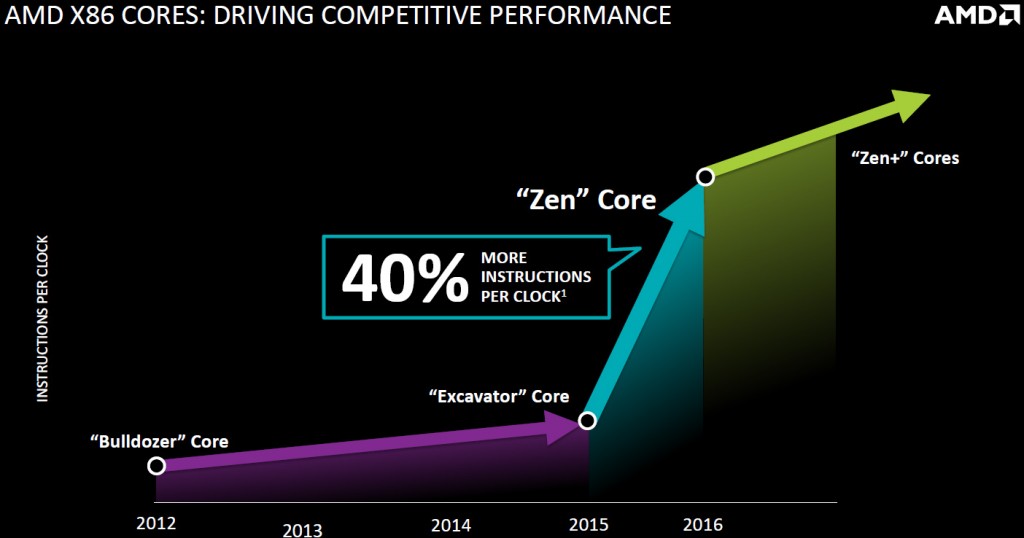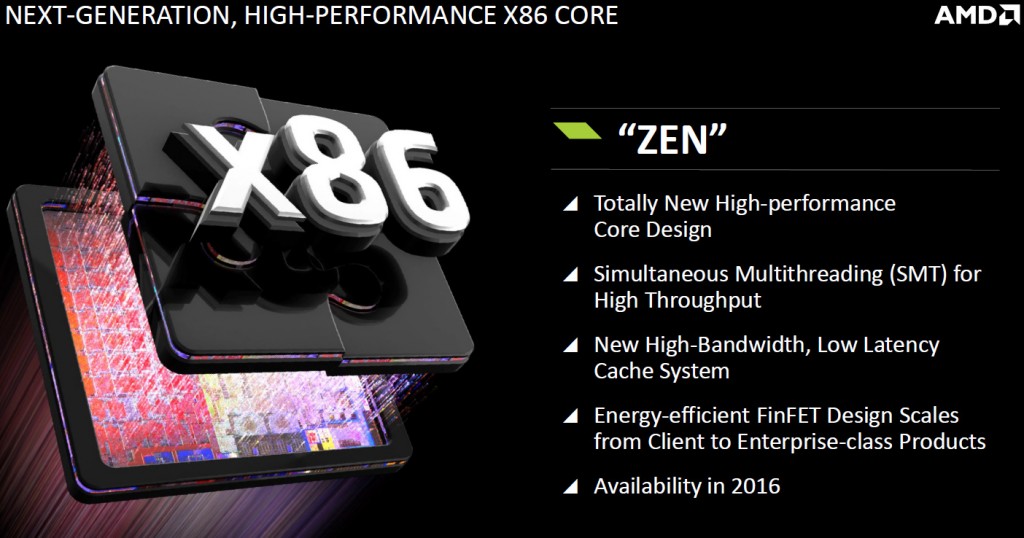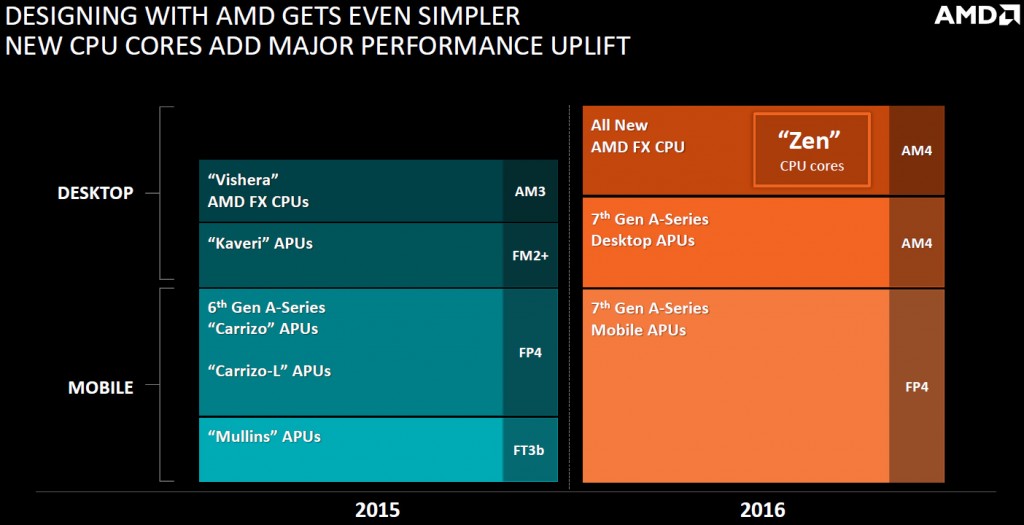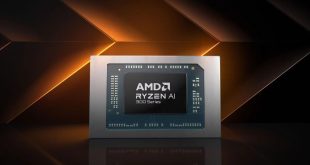Advanced Micro Devices on Wednesday confirmed that its next-generation high-performance x86 micro-architecture code-named “Zen” will power its leading-edge microprocessors in 2016. The company also revealed that its developers are already working on “Zen+” micro-architecture for its future processors.
Mark Papermaster, chief technology officer of AMD, said that “Zen” x86 processor cores offer 40 per cent higher instructions per clock performance compared to “Excavator” x86 cores. Essentially, this means that AMD’s next-gen central processing units will be 40 per cent faster compared to existing CPUs at the same clock-rate. According to AMD, the follow-up for “Zen”, currently known as “Zen+” will offer even higher IPC throughput, which means major micro-architectural enhancements.

“Excavator” is the pinnacle of “Bulldozer” micro-architecture, which was unveiled in 2011 and which has not managed to offer truly competitive performance compared to offerings from AMD’s arch-rival Intel Corp., partly because of its clustered multi-threading architecture that required sharing of floating point units by dual-core CPU modules.
By contrast, “Zen” micro-architecture will permit AMD to build microprocessors with powerful individual cores that support simultaneous multi-threading technology (SMT). SMT lets multiple independent threads to be executed by available resources of one modern CPU core, thus maximizing peak performance.
The new “Zen” cores will also feature completely redesigned high-bandwidth low-latency inclusive cache sub-system, which should tangibly boost single-thread performance of microprocessors.
40 per cent IPC improvement compared to “Excavator” does not automatically mean that AMD’s future chips will be 40 per cent faster than existing AMD FX microprocessors or AMD A10 accelerated processing units. Since the new chips may run at higher clock-rates, it is possible that they will be considerably faster than AMD’s contemporary CPUs and APUs. Alternatively, if the clock-rates are not high, the new products will show moderate performance improvements compared to today’s offerings.
As expected, microprocessors powered by “Zen” micro-architecture – which are allegedly code-named “Summit Ridge”, “Bristol Ridge” and “Basilisk” – will be made using 14nm FinFET (14LPP, 14nm low-power plus) process technology at GlobalFoundries.
Discuss on our Facebook page, HERE.
KitGuru Says: 40 per cent IPC performance improvement from generation to generation is absolutely impressive, assuming that this is an average performance improvement. However, it remains to be seen how well will AMD’s future designs perform. In theory, fine designs maximize micro-architectural advantages and we may see FX CPUs from AMD that will compete against Intel’s high-end Core i7 processors in 2016.
 KitGuru KitGuru.net – Tech News | Hardware News | Hardware Reviews | IOS | Mobile | Gaming | Graphics Cards
KitGuru KitGuru.net – Tech News | Hardware News | Hardware Reviews | IOS | Mobile | Gaming | Graphics Cards





I had completely given up on AMD Cpu’s . My next build will HOPEFULLY be an AMD on the AM4 socket. Hopefully it will be a more powerful CPU than my Intel I7-4790K. If not than “no thanks”.
This Zen Core is basicaly an early version of haswell, so maybe Zen+ will be better…2017…maybe…lets hope the AMD GPUs will deliver in benchmarks.
Let’s see x265 encoder perform on this new Zen+ CPU 😀
like to see 300MB video capture able to shrink to 80MB!
only 40% ? they need 100% to match haswell, and 120% to match sky;lake. And this paper 40% is questionable, available in some synthetic benchmarks. Fot others apps, only half of that.
If i have the right to dream about a last Generation of Consoles in the next year… ( i think after that we really will use Streaming for Gaming or Mobile Games will be strong enough)
The end of 2017(or 2018?) 8 Core AMD Zen+ in 10nm TSMC Finfet with a Radeon of that time.
I think it would give us up to 10 Tflops of power. But if a Radeon 390X has like 6 Tflops, i don’t know if that is really that great.
But we don’t know actually how fast excavator could be if the cores where delivered in a fx package….
I am going to agree with many people here; 40% is not enough unless they plan on releasing another 220W 5Ghz chip…
Nah man don’t think you understand what they mean by 40% clock for clock increase compared to Bulldozer – not compared to intel. Fairly simplistic example:
You take a 4.0Ghz Zen core, to get the same performance out of a Bulldozer it would have be clocked at 5.6Ghz.
A 5.0Ghz Bulldozer can match an i5/i7 clocked at ~4.5Ghz which is what most chips can manage. So for an i5/i7 to match what would be equivalent (although superior in other ways as well) to a 5.6Ghz 8-core Bulldozer chip they’d need to be clocked at like 5.0-5.2Ghz which simply isnt possible on a lot of chips without extreme cooling or hitting the silicon lottery.
So look at it this way, a 4.0Ghz Zen is probably equivalent to a 5.0Ghz i7… but WAIT you could simply overclock the Zen to 5.0Ghz… then the hilarity begins, because a 5.0Ghz Zen would be roughly a 7.0Ghz Bulldozer… presuming you can get that Zen to 5.0Ghz on air or an AIO then it would literally crap all over haswell and potentially skylake too.
Its a fairly simplistic assumption based example but its easy to see why you shouldnt really discount the chips until you actually see some hard tests.
Ah Don’t get your hopes up about there EVEN being a Zen+ because if Zen fails WHICH IT MOST LIKELY WILL AMD is TRULY DONE FOR!!!!! AMD has no hope but its amusing to see them try.
Seems that they are way over due for a new socket set. They been stuck on PCIe 2.0. (unless its the FM2+ with PCIe 3.0 but those CPU’s don’t interest me) Its been so long I almost gave up on AMD CPU’s because they were just getting out classed by Intel and only way for them to counter it is to drop their prices just to stay competitive. They did it again with NVidia with GPU’s because they had nothing to compare it to. I really don’t know how this is looking but it seems more and more developers are going to NVidia Gameworks which is only optimized for NVidia GPU’s and AMD GPU’s do not run very well on them. Even if the 390X might be better than Titan X, it won’t mean a thing if the games you want to play is only made for NVidia cards. This will be the same if the game runs better if they wright using Intel instructions to get better performance out of the CPU. At a marketing stand point it seems more people have PC’s running Intel CPU’s and NVidia cards so it would be quicker and cheaper to make games on those type of platforms than mixing brands like AMD CPU’s with NVidia cards or Intel CPU’s with AMD cards. There isn’t enough people with full AMD set ups for them to optimism the game for.
I love how you always bash AMD in every thread in every website. Please tell us how you already know they’ll fail. I’m assuming you have specs and benchmark results from inside AMD that no one else has.
Idiot troll aside, it’s welcoming to see AMD finally coming back to the PC market. a 40% IPC gain is something that I personally will be looking forward to. If they deliver, my next build will be a Zen build. Only thing that’s bugging everyone is the wait, but I think I speak for all of them when I say, let’s get a good chip more than having them being rushed out and underperforming.
If it does fail, will it also be amusing to see how much Intel hike their prices with no competition?
How much will it cost? I find it irritating intel charging me more for a dual core i3 in 2015 compared to the 6 core amd offers
Too bad CPU’s are more than just the frequency they run at.. And I’m like 100% sure AMD has no answer for Intel’s 5xxx Extreme i7’s
Any evidence on that? Got any benchmarks to back up your statement? It’s not “basically” anything because the product isn’t even out yet.. give it a chance.
why not? core i3 has faster single core performance than amd equivalents. Number of cores doesnt necessarily mean more performance ……
I totally agree which is why i said its a simplistic assumption. Yeah I dont see anything AMD has to offer being competitive with those chips, but then again the Extreme i7’s are out of reach budget wise to about 95% of the PC community.
they’ll hike them prices high since they’ll be sued for having a monopoly in x86 cpu’s.
the exact same as the last bulldozer based architecture, excavator only works as a low power mobile version of the architecture, its performance gains drop off at 35+ watts.
Ok. Thanks
40% over last AMD CPU gen isnt exactly inspiring, by the time this one hits the market Intel will bring forth broadwell E and possibly skylake refresh. Dont get me wrong, im still on sandy because of intel and their 5% anual increment, but I just cant get hyped over such a statement, mostly when current FX line-up is mostly competing against i5.
“AMD’s next-gen central processing units will be 40 per cent faster compared to existing CPUs at the same clock-rate” I think 40% is pretty inspiring as they’ll effectively be running at the same speed as an existing FX CPU with 8 cores at 5.6GHZ and more efficiently (with their improved ZEN architecture). We’ll just have to wait a year to see their actual performance against the intel equivalent.
Jeesh… the codenames are made up from that fatuous leak the other day – if they are real they do not indicate what you think they indicate and… please stop posting stuff that’s already been outed as madup bollocks. Ta’an’all.
it does for me. I’m sic of dual cores in 2015 and the only game that would use its single core performance is TORCHLIGHT II -_- even the FX6350 blows the i3 in terms of “bang for your bucks” factor
it should but amd themselves came forward and said excavator can only work as a low power chip due to how they designed it. (if i remember right it has something to do with increased transistor density making it harder to cool which means it can’t be clocked as high.)
Oh, yes… You’re right. Those high density libraryies. Forgot about that.
It used to be ‘only’ that – “how many MHz does the Processor run at”.
Then it was the ‘Additional Instructions War’, where either AMD or Intel offered ONE or TWO additional Instructions over the other. Next up was ‘Hardware Features’ featuritus, who could access Memory in fewer Clocks (etc.). Then came the ‘386, a HUGE leap from the (short lived) ‘286 days … of course there was no Software to run on it (the ‘386), save for a few Hardware Testing Programs.
Now things are even more complicated; but we WERE glad of Moore’s Law, for as long as it lasted.
Today we have an additional ‘Feature Split’ with Server CPUs being quite different from Consumer CPUs.
We have gone from having Floating Point implemented in Software (8086) to using a separate Chip to perform FP (8087), to embedding the FPU. Penultimatley we have GPUs implementing FP, and currently the GPU is being embedded within the CPU (which we call an APU) – we have gone in a circle, but now we do it MUCH faster !
Yeah and that’s why AMD hasn’t posted a profit in 3 years.
because people do not buy their products simple as that. But right now I am considering on buying their products instead of getting ripped off by high prices with the same technology designed to do the same crap
Difference being that the i3 can basically match the 6350 in games and you have the option at a later date like 1 – 2 years from now of picking up a 4790k for cheap second hand and getting more than double the performance, where as with the AM3 your limited to a FX8350 which isn’t much better than a 6300 or 6350.
I think the ability to have a massive upgrade for cheap down the line makes the extra $35 and the loss of 5% – 7% perfomance which you wont even notice now is more than worth it.
Intel wont hike there prices they have always been more expensive than AMD, they will just do what they have been doing for the past 4 years and not really improve the midrange offering and ask $600+ for CPU+MB for an actual upgrade.
Although that isn’t really tenable long term as ARM will eventually catch upto intel in high performance mid wattage CPU’s, and to continue actually selling CPU and people just going oh yay 10% performance increase, AND! So they even have to compete with there own stuff enough if they have no competition.
No core for core clock for clock a FX8350 cannot beat a i5 4670k even if overclocked to 5Ghz, Haswell has Bulldozer beat by 98% on Instructions per cycle.
Really though they don’t need to match Intel on per core performance if they could only get 60% – 80% then offered 16 cores then game over for intel, well with Zen a 40% IPC improvement and offering 32 cores is enough to achieve there goals of usurping the server/workstation market from Intel which is the goal of Zen.
Zen+ is to take the Consumer market which will have the 60% IPC improvement needed to take that market. Although that’s assuming Intel doesn’t have a massive ace up it’s sleeve which you can rest assured they do.
I’ve read benchmark results mate… the i3 struggles in Battlefield 4 and is jumping all over the place when it comes to performance -_- it’s a dual core rip off mate. The FX 6+ Series rofl stomps it everywhere even in GTAV dahell? give credit where credit is due
Nope AMD FANBOI the i3 rips EVERY AMD CPU A NEW ONE TWICE OVER!!!!!
AHAHAHAHHAHAHA….WRONG WRONG WRONG AMD is far inferior to the almighty INTEL!!!!!
That’s Right 40% IS EVEN CLOSE TO ENOUGH and I can’t emphasize that enough. Here is What AMD ABSOLUTELY NEEDS TO DO IN order not to DIE: The Main Thing is They need to make a NEW CPU with DOUBLE the IPC of their Current Crappy Chips, Slash the Power Consumption by a MINIMUM OF 1/4 at THE very least and then need to tack on a high performance low power HBM2 GPU and they need it Early 2016 otherwise it won’t be enough.
how so? I did test the i3 and the Athlon II x4 860k. Don’t get me wrong the i3 works wonders but going above the 750 TI is a huge bottleneck. The Athlon can be overclocked easily and even on stock it has 4 cores and can handle a GTX 960 no problem. Not to mention stuttering in Crysis 3 is decreased significantly do the math. I have been using intel for as long as I can remember but at this price segment the i3 is a rip off
The Fx 8350 has 2x ALUs and 2x AGUs per core, the i7 2xxx, 3xxx, 4xxx, 5xxx have 3x ALUs and 2x AGUs per core so it’s NOT 100% better than amd’s offerings it’s 50%
If AMD doubles the IPC over piledriver, then that would make it 33-37% better than haswell and ~30-32% better than skylake not that they can’t do it or that it isn’t possible, but it would cost as much as arse….
Look here: https://www.youtube.com/watch?v=gNt_KS0UUhI
The Intel i3 is better 8) AMD rubbish.
They are quite the same; plus the FX draws power like shit; As much as I hate the fact that intel is the market dominator, we can’t do anything about it; lets hope AMD makes a comeback or ARM ventures into desktop processor manufacturing
Lol you’re out of your mind, Haswell-E only has a 35% IPC over current gen FX chips. The DDR4 is also relevant to this IPC gain in Intel. Please do share where you got 100% from?
Most people don’t understand, that current AMD FX chips are only 35-37% IPC behind current Haswell-E chips. 40% put’s AMD in a good position to compete with the new Broadwell CPU’s, which won’t have to much of an IPC gain over current gen Haswell-E chips. Either way, you can’t expect a fanboi to have actual information on both chips.
You’re correct, that they don’t have an answer right now, in the next 5 years though, is another story. Either way you look at it, the X series from Intel, are mad expensive. the Intel 5960x cost over $1000, while the FX 8370 cost $200. Yes the 5960x has 8 core 16 threads, that have a 140w TDP. That chips cost 5x more than the AMD FX 8370, which has 8 cores and 8 threads. Yet in every benchmark, there isn’t even a 2x gain over the FX 8370 for performance. Kind of sad, that Intel charges 5x more, for something that gives you roughly 60% in performance. Even sadder, is that people pay those prices.
LOL, they haven’t? In actual terms of how many people work for Intel and AMD, AMD makes more money per year, based on how many employees work for both companies. You’re out of your mind, to say the least. It’s all free information, you have the internet and a computer/smart phone, as you’re posting in an online forum. How about using those resources to do research, instead of posting your opinions?
You’re out of your mind, I own an I3 chip and I also own a FX chip. Try using an i3 for rendering! You are also playing crap games if they run great on an i3. Up until 2013 all games didn’t utilize more than 3 cores, as 95% of games were ported from the Xbox 360 and PS3, which both used 3 core CPU’s. Now when talking about next gen games, and with the release of DX12, and the next gen consoles. You’re going to find it increasingly harder, to run newer games on a dual core CPU. Let alone try using game stream in Nvidia, while running an i3 (good luck on that)!
You state: “1 – 2 years from now of picking up a 4690k for cheap second hand and
getting more than double the performance, where as with the AM3 your
limited to a FX8350 which isn’t much better than a 6300 or 6350.” Are you serious, the 4690k only beats the FX 8350 in single core operations, all else, it gets wrecked. I would also like to point out, that DX12 will benefit the 8 core more, than it will a 4 core CPU, especially in games, when used by developers (which will most likely be adopted as both current gen consoles utilize 8 core AMD CPU’s).
oh.. most new games do not even support dual core processors…
And I own a fx 6350 and it is way better than even latest i3 processors for gaming..
And with dx 12, buying intel will be even more useless..
Intel is selling a lot because In few places like India, many people do not even know about amd..
And Intel is like a maruti car to Indians.. They have heard about it from start and they will trust it..
And 8350 gives the latest i7 top end processors run for their money with awesome performance in games…
Just google it..
It even beats $1000 intel i7 processors in few ones.. Mostly it is behind but difference does not explai over 5 times the cost.. One could get a top end gpu in sli or crossfire that one and an i7 processor..
SIngle core matter a lot but it is not that multi core does not…
just see benchmark and tell me difference in 1000 dollar intel and 8350… Negligible…
I think 40% does not take in shifting from 28 to 14nm… because 6% is what it can do alone sometimes…
4 months old topic and now the reply.
Here is Ashes of Singularity DX 12 benchmark. Core i3 matches FX 8370 quite easily.
http://www.pcper.com/files/imagecache/article_max_width/review/2015-08-16/ashesheavy-gtx980.png
lol 8350 needs to beat core i5 first ……….
https://www.youtube.com/watch?v=WZ_5p9wd2dk
The i3 will rip the fx a new one at single threaded tasks. For some multithreaded tasks the fx might prevail though. It depends on the software. And if you are including dedicated or integrated graphics. The IPC of the high end i3s, and with hyper threading, the extra cores in amd wont give so much benefit.
I cannot see Fx 8350 here….
And it also mathces i7 6700k to close extent on high at 1600p..
These results are basically because with dx 12, cpu does not matters a lot…
A dual core i3 can give these perfromance but have you seen benchmarks of fx 4100???
Probhably closer to 8350…
Unless a game comes that need a lot and lot of cpu, i3 and i5 make no difference…. And fx 4100 is cheaper than i3….
It has FX 8370 there, which is newer and 100mhz faster than FX 8350 ……….. probably you dont even know this ………
and how does it match at 1600p high with 6700k? it cant even match core i3 4330 here lol …….. read the graph properly ……..
In some cases, this might help..
http://www.technologyx.com/featured/amd-vs-intel-our-8-core-cpu-gaming-performance-showdown/
Sorry for late reply..
8350 is well good for money…
And in this video, it is definately a bottleneck to titan x…
When paired with a suitable gpu, its pretty good..
no more Advanced Microprocessing Device if the new ” AMD ZEN ” cpu Fail..!! marks my word..
i hope the new AMD ” ZEn..? ” beats high end corei7 with the lowest price…
+plus new AMD will be same price as Intel core i7 because you need to buy more expensive liquid cooling system..if not your PC will restart automaticly..
LOL….. GAMEWORKS OVERLOAD…….
Skylake is even better then Broadwell..
This benchmark is GPU dependant. You can’t use it to compare two CPUs